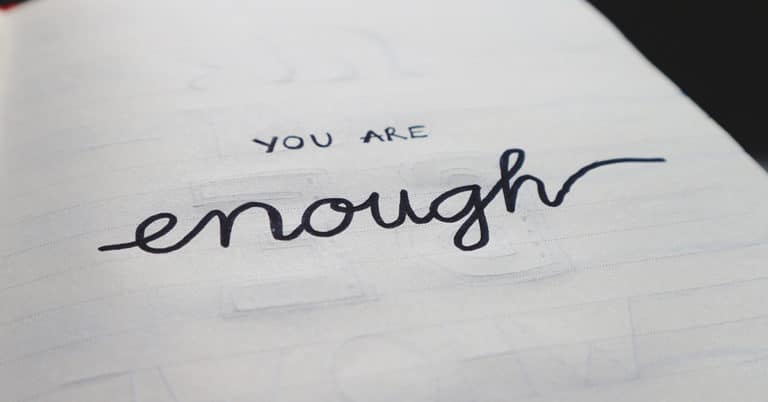

Everyone on earth has imperfections, but sometimes this is extremely hard to accept. No matter how many compliments, achievements, and good decisions you accumulate, there are probably moments when all you can see is your very worst traits.
You might obsess over the skills you've never managed to master. Or, you resent the way your friends perform better in social groups and constantly replay what you see as your failures. And if you are myopically focused on your flaws in this way, it's tough to be happy or to find any lasting sense of success. You create a vicious cycle of self-loathing.
This guide looks at how you can shift your perspective. Let's start by beginning to embrace your flaws instead of letting them undermine your self-esteem.
We'll explore why this is so important. Plus, we will work through a range of seven different powerful techniques that promote an attitude of acceptance, compassion, and understanding towards yourself.
Embracing your flaws is about accepting that everyone is fallible and that it's nonetheless possible to be lovable, good and successful. That isn't to say you should give up on self-improvement and personal development, citing as an excuse that “nobody is perfect”. Rather, the thought is that you should be kinder to yourself about the things that don't go so well in life, the issues you struggle with and the skills you can't quite seem to master.
All of these changes will help you focus on the areas where you can thrive. Let's now turn to seven of the best ways to embrace your flaws.
 1. Make A List Of All Your Strengths And Abilities
1. Make A List Of All Your Strengths And AbilitiesTo help you see that your flaws are just one aspect of you and don't determine your worth, make a deliberate effort to focus on the good. Challenge yourself to make a comprehensive list of all your abilities and strengths, adding absolutely everything you can think of.
Remember the traits friends and colleagues have highlighted, from when you were very young right up until now.
You might be tempted to leave out things you think everyone has, or that you feel lack significance, but do your best to omit nothing. Include basic character virtues like honesty, loyalty, and empathy. You might be surprised by how long the list becomes.
If you feel good after writing it, consider putting it somewhere prominent so it can serve as a regular reminder of your strengths. Alternatively, distill the list down to your top ten traits, and put that next to your mirror or on the front of your fridge.
A related activity involves doing much the same exercise described above but focusing less on your character traits and more on the things you're proud of. In other words, your best accomplishments and outputs.
While your mind might immediately go to academic achievements, qualifications, and prizes, it's important to take a more inclusive approach when applying this technique.
Remember things you survived, obstacles you overcome, and times you surprised yourself. Appropriate examples include good deeds you did for friends or strangers, things you did even though you were afraid, and moments when you pushed through heartbreak or disappointment.
What you can learn from this list and the previous one is that you're capable of so much more than your flaws might suggest. The parts of you that you dislike or that make you feel uncomfortable are just tiny pieces of the picture when it comes to who you are, and they don't need to hold you back from greatness.

Reframing is a technique that challenges the basic assumptions underlying the beliefs you have about yourself and the world. It doesn't change who you are, but it does adjust the way you see your nature.
In sum, what you need to do here is to reexamine why you decided that specific parts of you counted as flaws. Write down the top ten flaws that bother you, and next to each write down your main explanation for why you don't like these things.
Next, figure out at least one positive side of each flaw (and if this is difficult, look back at your list of strengths and do your best to see potential connections between strengths and flaws).
For example, say you've written down on your list of flaws that you dislike “how easily upset you are”. Is that not also connected to your ability to offer kindness to others, or to some of your achievements?
If you're like most people who think a lot about their flaws, you probably have a highly critical inner voice. In other words, you probably say negative things to yourself a lot of the time, like a punitive parent or a harsh teacher. It's hard to feel good or confident when you speak to yourself in this way. Therefore, it's vital to avoid self-criticism if you want to accept and embrace your own fallibility.
When you notice critical thoughts creeping in, identify them as such and then reject them. Say to yourself “Oh, this is the “I'm never good enough” thought coming back again” or even simply “I don't need to listen to this”.
Wherever possible, speak to yourself in a considerate, constructive way. For example, the way you'd speak to someone you love, or even just someone you minimally respect. In time, this new habit will stick and the voice of the inner critic will become steadily less powerful.
 5. Accept Praise From Others
5. Accept Praise From OthersPeople who obsess about their perceived mistakes, failures, and flaws often find it really difficult to accept praise from others, even when it's objectively well-deserved.
So, you might find yourself saying things like “Oh, it was nothing!”, or “My idea wasn't that good”, or even something like “I don't really deserve the praise, sorry”.
If you want to practice self-acceptance and begin to feel better about yourself, it's important to accept positive comments from others.
Simply say “Thank you” or “Oh, I really appreciate that!”.
If it's appropriate and fitting, you can also respond with a suitable complement of your own.
As a bonus, accepting sincere compliments from other people will also help you get along with them better. After all (although you might not be thinking about it at the moment), rejecting a compliment can be experienced as rude, dismissive, or rejecting.
The key thought behind this technique is that you have to accept things as they really are before you can make significant, lasting changes to something. So, if you try to rewrite your character (or even just change little bits of it) without ever stopping to acknowledge and appreciate who you are, you can accidentally harm yourself by trying to change in self-undermining ways. Once you're able to think about something in a more positive way, you can then make a productive plan of action for future change.
For example, if you didn't get the job you wanted, don't set out to get the next one by saying “I'm so stupid and bad at interviews”. Instead, note some of the reasons why you deserve to get a great job. Note down some of the areas in which you actually did well, and then turn to the issue of what you can improve.
 7. Recognize Unrealistic Standards
7. Recognize Unrealistic StandardsTry to pay more attention to the standards you're trying to live up to.
Firstly, consider that the media constantly bombards us with airbrushed images suggesting that perfection is attainable when it isn't. Secondly, remember that even some of your friends likely use social media in a misleading way. They may represent their lives as though they are more perfect than they really are. Thirdly, reexamine the standards that were imparted to you in childhood, possibly by family members with their own hang-ups and self-esteem problems.
Once you start to make these types of standards explicit, you begin to see them for what you are and free yourself up to set your own standards. As you do so, focus on making the most of your natural gifts in a realistic way.
Accept that you don't need to be amazing at everything in order to be a truly valuable, wonderful person.
